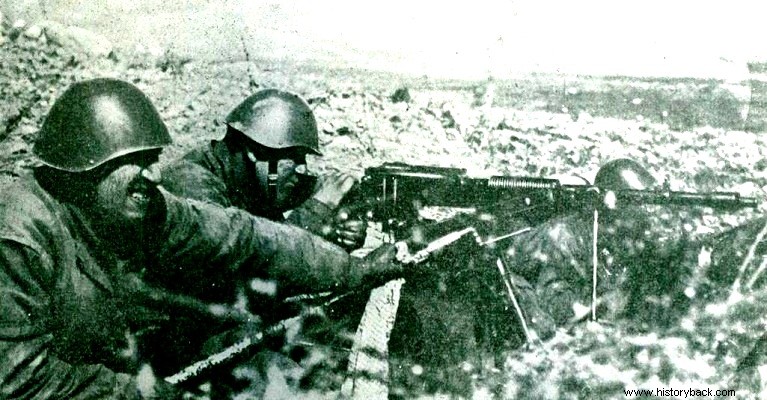
The eponymous Battle of the Forts began on April 6, 1941 with the unprovoked German attack on Greece. The missing Greek forces covering Eastern Macedonia fought with unimaginable heroism. The center of the Greek formation was guarded by the 14th Infantry Division (MP) having organized its forces in two complexes, that of Sidirokastro, west and Karadag, east.
The Karadag Group was commanded by Colonel Georgios Salvanos , a brave officer who served shortly before the war in the VIII MP of Katsimitro in Epirus. The Group had a strength equal to approximately four infantry battalions, the VIIth Artillery Group (2 artillery pieces) and an 85mm artillery piece. and the fortresses of Persek, Babatzora, Maliaga, Perithori and Partalouska. These forces were deployed in two sub-sectors, the Western and the Eastern.
The Eastern Division under Lieutenant Colonel Krasanakis had the I/73 Infantry Battalion (TP), a company of the II/73TP reinforced with 2 machine guns, two ambush companies and as a reserve the 10/73 Company with a machine gun platoon (4 machine guns ), together with the forts of Maliaga, Perithori and Partalouska. The German attack focused on this very sub-sector. Opposite was the German 72nd MP.
The German attack
The Germans attacked at 05:15, April 6, 1941, that is, before their ultimatum had even expired and officially start the war, suddenly, without artillery preparation. Then the fight became general with the Germans focusing their efforts on the extrication of the Perithori fort. On the following April 7th, the Germans managed to capture the center of resistance on the Stavros hill (altitude 746) by expelling a company of the I/73TP that was holding it. But soon a Greek counterattack put the Germans to flight and the hill came under Greek control again . All the efforts of the Germans against the Perithori fort were also drowned in blood.
The next day, April 8, the Germans attacked the fort again, which was in danger, but was saved by an epic counterattack by his men – even the wounded carriers – who routed the enemies. However, the 8th of April was the day of judgment of the race. The German forces, having literally dismantled the Yugoslav forces, began to invade Greek territory west of Lake Doirani, threatening to encircle the entire location. Following this, in view of the certain occupation of Thessaloniki the following day, the commander of the Eastern Macedonian Army Department (TSAM), with the approval of the General Headquarters, began negotiations with the Germans. However, the guns were still not silenced.
In the Karadag Complex, a German company managed to penetrate between the Maliaga and Perithori forts, on the Sulla hill, expelling a Greek battle group holding it. An immediate Greek counterattack, however, resulted in the annihilation of the German company (80 dead, 5 prisoners) and the recapture of the hill. Another German force penetrated between the Perithori and Partalouska forts and after overturning a Greek machine gun team (2 machine guns) on Kouri hill, attacked the Greek 152mm artillery gunners. which was close by. The gunners after a fierce battle retreated leaving their guns.
Colonel Salvanos, however, immediately organized a counterattack. Three infantry platoons, a machine gun platoon (4 machine guns) were assembled and together with the gunners, under the artillery commander Captain Douro, rushed against the Germans. This counterattack seems to have come out of the pages of the Iliad! With the slogan "Air!" to vibrate the atmosphere, the Greeks charged with the spear against the single enemies, crushing them. The German battalion was disbanded, its commander, together with 102 of his men were captured!
But the Germans had managed, at dawn, to penetrate from the Cresti hill to the rear of the Greek forces. Immediately Salvanos gathered every available man, cooks, clerks and assistants and with the support of ulama artillery (2 guns) ordered an immediate counterattack. The first Greek counterattack limited the Germans. Successive attacks by the Greek forces followed until finally the Germans were forced to surrender. The victorious Greeks captured 250 prisoners
It is worth noting that since the morning Salvanos had already received knowledge of the occupation of Thessaloniki and the ongoing negotiations for capitulation. But Salvanos made it clear to his superiors that he did not intend to surrender and would attempt to collapse their forces towards the sea. He did try to escape with his men, but was eventually forced to lay down his arms due to being surrounded by the Germans. Before that he led his men to Serres, armed in formation and after they all sang the National Anthem together, they laid down their honored weapons.
